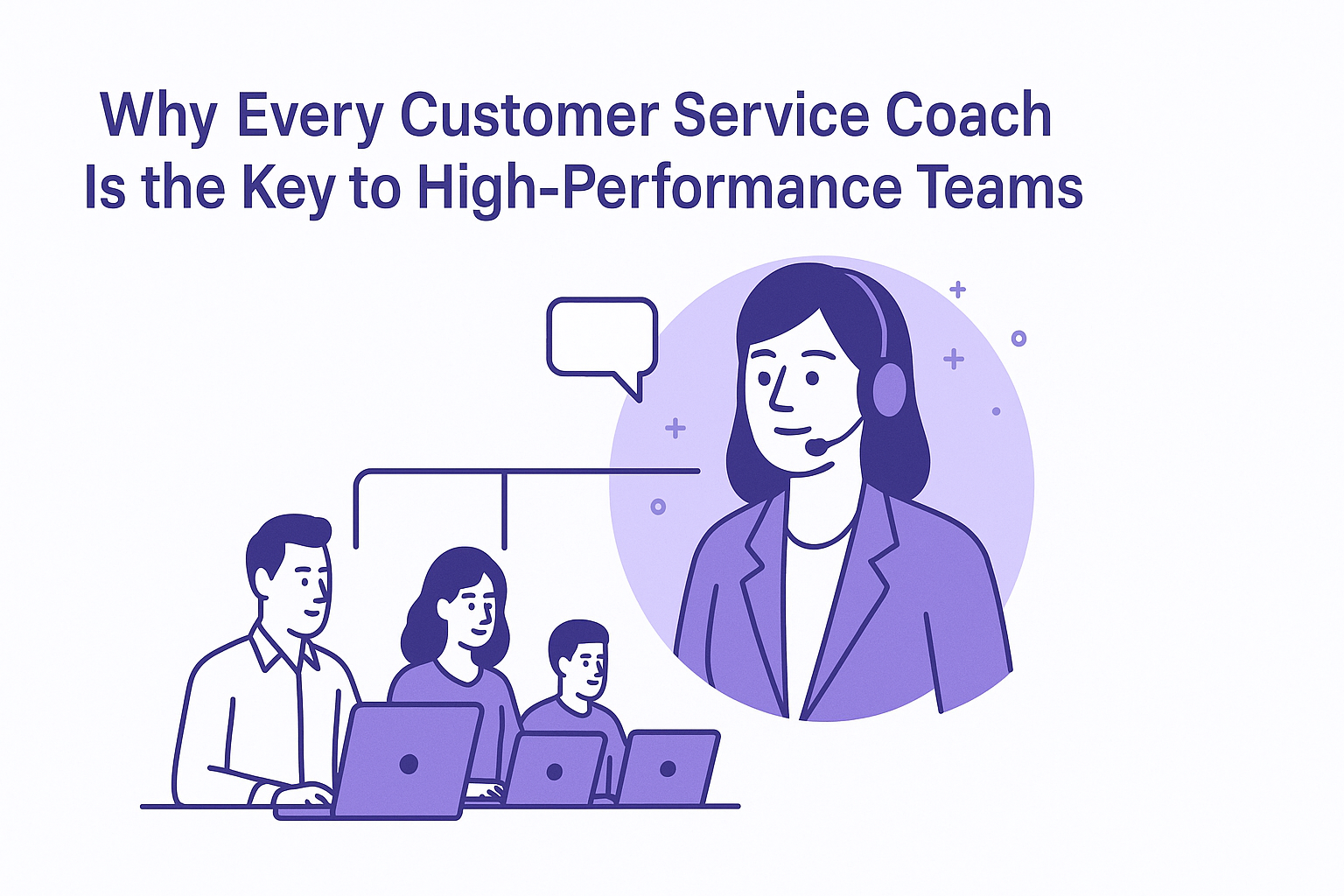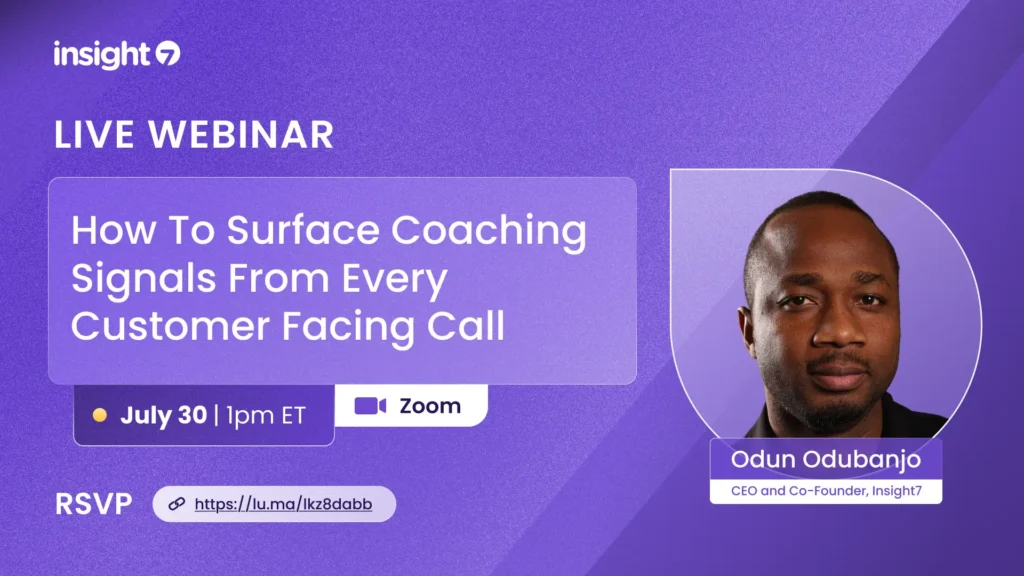Why Every Customer Service Coach Is the Key to High Performance Teams
-
Kehinde Fatosa
- 10 min read

When customer service teams fall short, most companies blame the agents. They roll out new tools, introduce updated scripts, and double down on QA workflows. But despite all that, the needle barely moves.
The real issue? They’re skipping the person with the most influence over team performance: the customer service coach.
Stop Blaming the Agents. Start Coaching the Coaches.
Companies spend millions optimizing agent workflows. Real time guidance. AI generated summaries. Automated scoring systems. All valuable. But insight without support doesn’t drive change.
The reality is, most agents can’t consistently self correct. You can show them their gaps, but that doesn’t mean they’ll close them. That’s why the role of the coach is so critical, yet in many organizations, the coach is an afterthought.
The Untapped Power of the Customer Service Coach
Let’s get specific:
- A coach call center teams rely on typically supports 15 – 25 agents.
- Even a small 3% improvement per agent adds up to significant gains across the team.
- The coach influences not just what agents do, but how they grow and adapt over time.
Great coaches:
- Turn feedback into behavior change.
- Help agents connect the dots between insight and action.
- Build accountability, motivation, and consistency.
They’re not just mentors. They’re performance engines. But only if they’re set up to win.
What’s Holding Coaches Back?
The problem isn’t talent. It’s time.
Most coach customer service leaders are swamped with tasks that take them away from actual coaching:
- Manually reviewing call recordings.
- Writing performance feedback from scratch.
- Digging through transcripts to spot trends.
- Scheduling 1:1s that constantly get pushed.
They’re overloaded and reactive. Which means the coaching agents receive is:
- Delayed.
- Inconsistent.
- Surface-level.
That’s not a coaching problem. It’s an operational one.
The Fix: Coach the Coach
If you want high-performance teams, the strategy is simple:
Don’t just coach the agent. Coach the coach. Here’s what that looks like in practice:
1. Automate the Admin
Free your coaches from the grind so they can focus on coaching. Use automation to handle:
- Call summaries: Auto-generated recaps that capture what matters.
- QA scoring: Consistent, scalable evaluation without the manual lift.
- Tagging & themes: AI-driven identification of recurring issues or strengths.
This removes hours of work per week. More importantly, it gives the coach real-time visibility into what’s working and what’s not.
2. Surface Coaching Opportunities
Don’t make coaches dig. Instead, serve them:
- Top coaching moments: Highlight calls where things went off-track or went exceptionally well.
- Behavior trends: Flag common mistakes (e.g., talking over customers, poor tone, lack of empathy).
- Agent prioritization: Automatically rank who needs coaching most urgently based on data.
This ensures coaches spend their time where it matters.
3. Support Coaching Quality
Good coaching is a skill. Coaches need feedback, too:
- Tone and clarity: Tools that evaluate how constructive or motivating a coach’s feedback is.
- Coaching impact: Dashboards that show how coaching sessions correlate with performance.
- Suggestions: Nudges on how to phrase feedback more effectively or tie it to KPIs.
When you enable the customer service coach, you multiply their effectiveness—and that multiplies team success.
Why This Works: Real Impact at Scale
One coach. Twenty agents. That’s a lot of leverage. Now imagine:
- 2% improvement in resolution time per agent.
- 3% lift in customer satisfaction.
- 5% increase in first-call resolution.
Now multiply that across your entire support org.
These aren’t just metrics. They impact NPS, customer retention, and even revenue.
Let’s be real: training every agent perfectly isn’t scalable. But improving your coach call center capability? That is.
A Better Coaching Culture Drives a Better Customer Experience
Companies with strong coaching cultures don’t just have better numbers. They have better people:
- Agents grow faster.
- Turnover drops.
- Morale improves.
- Customer conversations get smarter, faster, more human.
The customer service coach sets the tone. When they’re empowered, they create a team that thrives on feedback, adapts quickly, and shows up consistently.
That’s how you future-proof your support function.
FAQs
Q: What does a customer service coach actually do?
A: A customer service coach observes agent interactions, identifies strengths and weaknesses, delivers feedback, and supports performance improvement. They connect the dots between what the data shows and what the agent needs to do differently.
Q: Why is coaching agents directly not enough?
A: Coaching agents one-by-one can work, but it’s slow and resource-heavy. Coaching the coach scales expertise and creates consistent impact across entire teams.
Q: How can automation help customer service coaches?
A: Automation handles the repetitive, low-value tasks like QA scoring, transcription, and tagging. This gives coaches more time to focus on strategic feedback and agent development.
Q: What should I look for in a good call center coaching platform?
A: Look for tools that prioritize surfacing coaching moments, track coaching effectiveness, and offer clear insights into agent behavior trends.
Q: Is coaching still relevant in the age of AI customer service?
A: More than ever. AI handles tasks. Human coaches build capability, empathy, and decision-making skills, things automation can’t replicate.
The Coach Is the Strategy
You want better agent performance? Don’t start with agents. Start with the person who shapes them: the customer service coach.
Enable them. Equip them. Support them.
Because the fastest way to improve customer service at scale isn’t a tool. It’s a coach with the time, data, and guidance to do what they do best.
That’s your real competitive advantage.





